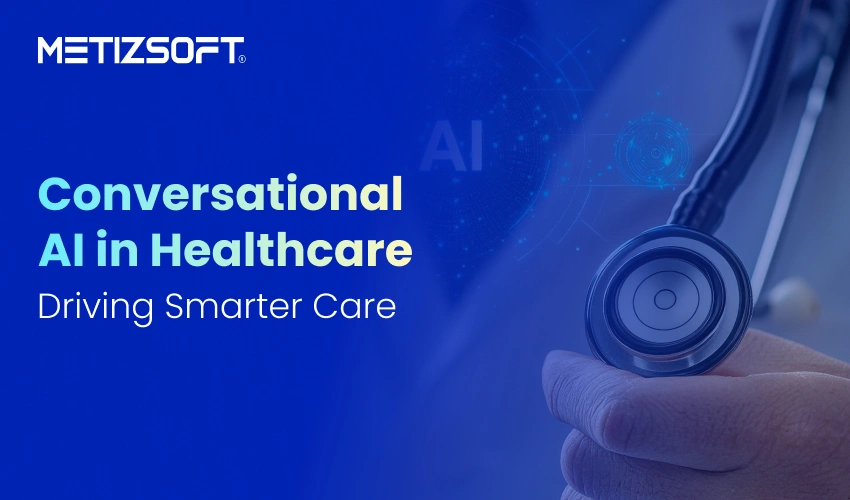
Table of Contents
Summary
Conversational AI in healthcare is transforming how patients and providers communicate. With abilities like real-time, personalized conversations across apps, websites, and messaging, it improves access, efficiency, and patient satisfaction. Today’s AI goes beyond simple chatbots to offer 24/7 support, symptom triage, medication reminders, mental health help, and more. As a result, Healthcare organizations are proactively looking to hire AI experts and consult AI service providers to implement AI healthcare solutions that ensure seamless integration and reliable support.
Introduction
There is increasing pressure for on-demand access to care. Patients need questions answered, support, and services anytime, anywhere. Digital disruption is occurring at an accelerated pace, and conversational AI technology in healthcare is at the heart of this shift. This virtual integrative platform connects patients and medical providers, providing a personalized care model while supporting self-care, improving task workflows, and enhancing practice experience.
With the healthcare AI market projected to reach $187 billion by 2030, it’s clear that healthcare powered by AI is shaping a smarter, more efficient healthcare system.
This blog will explore how conversational AI for healthcare works, its practical use cases, benefits, challenges, and the promising future it holds.
What is Conversational AI in Healthcare?
Conversational AI technology in healthcare refers to smart applications like chatbots and virtual assistants that understand and respond to human language naturally. Unlike basic rule-driven chatbots, this modern technology in healthcare leverages NLP (Natural Language Processing), Machine Learning, Speech Recognition, and Sentiment Analysis. These allow for multi-turn, context-aware, and adaptive conversations.
The AI works across websites, phone systems, mobile apps, messaging platforms, and EHR to offer continuity of support to patients. For instance, it is capable of handling appointment bookings, patient queries, or it can instantly remind patients about their medication.
Conversational AI vs. Rule-based Chatbots Comparison
| Feature | Conversational AI | Rule-Based ChatBots |
| Conversation Style | Natural, multi-turn, adaptive | Fixed scripts, single-turn |
| Understanding Context | Yes | Limited |
| Learning Ability | Improves with data and usage | None |
| Personalization | High, based on patient data | Minimal |
| Channels Supported | Multiple (apps, IVR, EHR, messaging) | Limited |
Practical Use Cases of AI Transforming Healthcare
Healthcare organizations are rapidly adopting AI-powered healthcare solutions for a range of tasks, which improve patient care and operational efficiency.
- Appointment Scheduling & Reminders: AI assists patients in booking or adjusting appointments anytime, supports multiple languages, and sends SMS or email reminders.
- 24/7 Patient Support & Triage: AI symptom checkers guide patients to decide self-care or doctor visits, easing emergency room loads.
- Medication Adherence & Refill Reminders: Automated alerts help patients remember medications and coordinate with pharmacies.
- Chronic Disease Management: AI remotely monitors patients, offers coaching, and escalates alerts when urgent care is needed.
- Mental Health Support: Conversational AI offers anonymous emotional assistance, stress relief, and basic cognitive behavioral therapy.
- Patient Feedback & Satisfaction Surveys: Automated surveys gather timely feedback to enhance services.
- Billing Inquiries & Insurance Navigation: AI clarifies bills, monitors claims status, and reduces staff workload by handling common questions.
Key Benefits of Using Conversational AI in Patient Care
Conversational AI brings some clear advantages to the table:
- Better Access: Patients can get support anytime, day or night, in multiple languages, no matter where they are.
- Personalized Interactions: By connecting with patient records (EHRs), the AI can give advice that fits each person’s unique history and needs.
- Less Work for Staff: It handles routine jobs like answering questions, booking appointments, and sending reminders, so healthcare workers can focus on more complex patient care.
- Higher Patient Satisfaction: Patients enjoy faster, reliable responses and a greater sense of independence, leading to better overall experiences.
- Cost Savings for Providers: Fewer phone calls and fewer missed appointments help lower the overall costs for healthcare organizations.
For example, Northwell Health used AI-powered healthcare to handle more than 150,000 interactions around COVID-19, relieving pressure on its care personnel.
Real-World Applications & Trending Examples
A lot of top healthcare systems are using conversational AI to make things better for patients:
- Providence Health: They automated their scheduling, which cut down on wait times and reduced the number of missed appointments.
- Cleveland Clinic: They offer an AI symptom checker to help patients figure out when they need medical care.
- UCHealth: They use AI for follow-up checks after patients are discharged, which helps track their recovery progress.
Upcoming launches in 2025 and beyond are expected to concentrate on features like enhanced personalization, real-time data access, and improved mental health support. These developments really underscore the ongoing innovation happening among AI service providers and AI development agencies.
Recommendations for Conversational AI Deployment
Healthcare organizations aiming to succeed with conversational AI technologies must:
- Set Clear Goals: Match the use of AI with actual patient or operational needs.
- Select Complaint Solutions: Make sure it is HIPAA compliant and integrates with EHR.
- Begin Small, Scale Up: Pilot programs allow AI to become fine-tuned by the time of broader deployment.
- Mix Man with Machine: Make it easy to pass off from AI to human care-givers.
- Monitor and Improve: Keep an eye on progress and evolve with the trend. Don’t let your tool or communication strategy become outdated.
Partnering with a renowned AI development agency or seeking AI consultation helps ensure best practices in deployment.
Major Challenges and Considerations
Hurdles come with any major innovation. So, you’ll almost certainly encounter some when you begin rolling out conversational AI in your healthcare system.
Here’s a list of possible challenges and how you solve them:
- Preserving Information and Compliance: We must maintain the security of patient data and adhere to HIPAA regulations.
- Bias and Accuracy: The AI engine must be trained on a variety of data and meticulously verified to ensure no errors or bias in the decisions.
- Making it All Work Together: The AI needs to integrate smoothly with the systems we already use, like EHRs and CRMs.
- Building Trust and Encouraging Use: Being transparent about how the AI works and showing empathy can really help people feel comfortable and willing to adopt it.
- Costs and Complexity: Select vendors who offer solutions that are affordable and bring space to grow with our needs.
Keeping a close eye on things and maintaining open communication are key to tackling these challenges.
The Future of Conversational AI in Healthcare
Going forward, we can expect conversational AI in healthcare to become even more:
- Personalized and Emotionally Aware: It will get better at understanding how patients are feeling and offering support that’s just right for them.
- Connected with Wearable Tech: By tapping into real-time health data from devices like fitness trackers, it can help with proactive care.
- Localized: markets are designed to support many different languages and cater to specific regional needs.
- Proactive: AI will be able to spot significant health risks early on and take today’s steps to prevent problems.
The growing AI healthcare market is a strong sign that there’s a lot of innovation happening, and this technology is going to become much more common in the near future.
Conversational AI for Smart Care
Conversational AI technology in healthcare is no longer futuristic; it is today’s reality, which is playing a crucial role in modern care. It enhances accessibility, streamlines operations, boosts patient satisfaction, and reduces costs.
Healthcare providers who plan to implement this next-gen technology in their setup must now hire AI experts by collaborating with a reliable and experienced AI development agency to strategically deploy AI development services that transform patient experiences.
Frequently Asked Questions
How does conversational AI help patients?
It gives patients round-the-clock access to medical information, helps them check symptoms, schedule appointments, get reminders for their medications, and offers support for their mental well-being.
Are conversational AI systems secure and HIPAA compliant?
Yes, reliable AI providers make sure their systems follow healthcare privacy laws and work hard to keep patient information safe.
Can conversational AI replace doctors or nurses?
Not really! It’s designed to assist healthcare teams by taking care of everyday tasks and offering initial advice, but it can’t take the place of actual medical professionals.
How can health care professionals get going with conversational AI?
They can begin by establishing their objectives, selecting AI services that are compliant, experimenting with small projects first, and incorporating the mechanisms to scale the system.
AboutManthan Bhavsar
Related Posts
History of Artificial Intelligence (AI): The Rise of Machines & Technology
Throughout the centuries leading up to the 1950s, numerous philosophical and logical concepts emerged. Collectively, these...
What is Artificial Intelligence (AI)? A Comprehensive Guide!
Hey Siri, Alexa, or Google Assistant, please show me the best bakery nearby or help me find the best restaurant near the...

